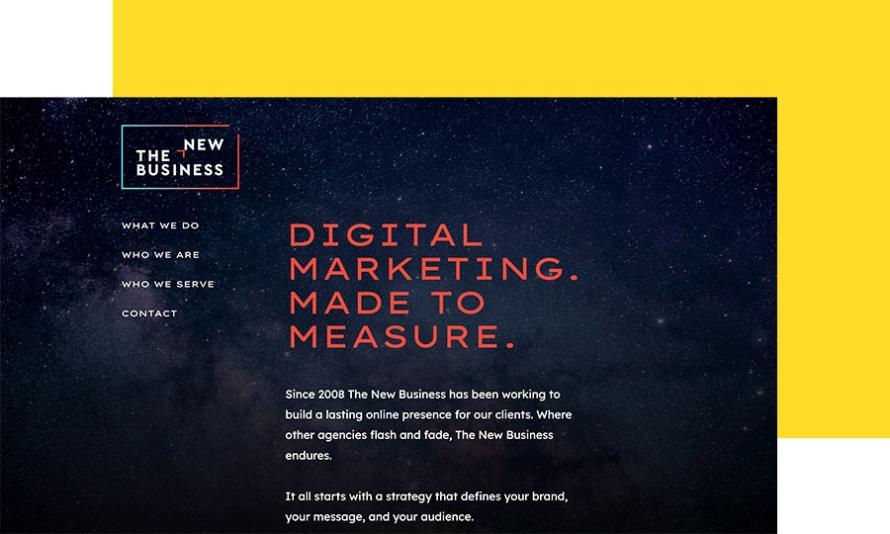Why a Decoupled Practice Works for the Tourism Industry
Image

The New Business (TNB) is a digital marketing agency helping businesses deliver extraordinary online experiences. CMS-agnostic, TNB is leveraging Front-End Sites on Pantheon to help their clients in the tourism industry win over new audiences. Read our interview with Mike Jacobs, TNB’s Co-Founder, to find out how decoupled helps achieve business agility and deliver the best user experience.
I can say that the decoupled approach really suits us not just because it’s how we like to work. It’s the direction that we see our niche moving: away from monolithic sites with extremely overbuilt, feature-heavy backends to something that puts more focus on the front end where conversions happen."
- Mike Jacobs, The New Business Co-Founder
Pantheon: How did you start working on decoupled projects?
Jacobs: We were searching for faster, more efficient ways to make smaller brochures and one-off sites. And we started working on a lot of apps. We got really comfortable with the idea of using a single backend to power multiple front ends. So it was no surprise that our decoupled practice started to take off.
We then spent a lot of time looking for our ideal decoupled backend. We tested absolutely everything. In the end, we came back to Drupal. None of the hot new CMSes are any more capable than Drupal once you get down to serious work with multiple content types and complex publishing workflows. At the same time, we’ve gotten really good at stripping the Drupal backend down in a way that makes it very easy for clients to understand right away how to use it. And, frankly, we didn’t trust anyone else to handle our hosting the way we trust Pantheon, so we were incentivized to look for ways to stick with Drupal. We're really excited that you embraced and released a front-end solution and to have launched our first front-end project on Pantheon. It went very smoothly.
Image

Pantheon: Tell us about this project! What was the discovery process like?
Jacobs: Our client, Secrets of the Back Forty, happened to be fun and adventurous. Their website is a travel guide to Huron-Kinloss, a rural area in Ontario, Canada. They had a small budget and wanted to get the most out of it. So we suggested: “Put your faith in us and the speed of this workflow and let us handle content updates as part of your yearly support contract. That way, we can shift the budget from backend work to front-end work where it will have the biggest impact. We can spin up a super simple and easy-to-use backend that will allow you to do basic things like publish articles and change menu items, but everything else will be in-code (MDX is so good for this). Our development team can take the extra time that we aren't spending on the backend and create awesome pages with all kinds of little details and deliver a delightful experience to your visitors. Oh, and your site will be faster and much more secure.” They saw the light in that approach.
Pantheon: Has this approach worked for other clients?
Jacobs: Yes. So, we have two main clients in tourism: tourism operators (lodges, guides, events, etc.) and then what is called DMOs, or destination marketing organizations, that are tasked with marketing a geographic region (Destination Northern Ontario, for example). A lot of these sites are way overbuilt, at both ends of the spectrum. They have too many categories of content and too many features on the front end. They try to be everything to everyone. It's a common marketing problem in tourism. The sites are so complex that DMOs will need a full-time staff member to handle a constantly evolving backend.
Several WordPress sites that we've inherited have been built on third-party page builders. They are a total mess: every change made by a staff member over the years has broken something on mobile, for example. It's an ongoing problem. So we're on a quest as a marketing company to help DMOs spend more time doing what they're good at: reaching new customers and connecting them with their members. We want their websites to be cutting edge, uber fast and secure, as well as to deliver their messaging to the right audience at the right time. To do that, we’re asking site owners to leave the majority of updates to us. But if we’re going to take that on as a company, we want the best UX possible—and a decoupled approach makes that possible. Our clients have been very responsive to this approach.
Pantheon: We’re so excited to have Secrets of the Back Forty live on Pantheon’s Front-End Sites! What made it a prime candidate for decoupled?
Jacobs: The site turned out so well! The Huron/Kinloss region is this really beautiful little slice of Ontario that you can bicycle around in a day: lakeside and a lighthouse on one end; farmland and old-growth forests on the other. The Secrets of the Back Forty brand is just as welcoming and cozy as the region. Our designer hit upon the idea of creating a site that invites you deeper and deeper into the region, unlocking secrets as you go, almost like reading a beloved travel guide. It’s the kind of concept that takes a lot of trial and error to get it right. To really make the site come alive, we created several interactive itineraries using tools from the Tourism Technology Co., and it was so easy to integrate them with our Next.js front end and power them with our Drupal backend. Overall, working on this site was a very nice change from the giant sites we make for larger tourism regions, and it really helped us think more deeply about what tourism sites can and should do. It’s that spirit of experimentation that we enjoyed the most with this project.
Pantheon: How difficult is it to find talent to work on decoupled projects?
Jacobs: When it comes to building one of these sites, we’ve found that a single Drupal backend professional can support several developers on the front end, including much more junior ones. It’s been great to be able to bring on talented junior devs who only know JavaScript and watch them easily jump into projects that previously would’ve required a lot more familiarity with Drupal or WordPress and a much steeper learning curve. And, frankly, Drupal developers are very rarely out of work and it’s getting harder to hire them — we love that we can keep Drupal in our stack, but do most of our work in a language as popular as JavaScript. Oh, and one other tip that has made it easier for developers to jump quickly into projects: standardizing on Tailwind (for both Next.js and Drupal twig templates) has been a game changer for us.
Pantheon: How has your partnership with Pantheon helped you drive your decoupled practice forward?
Jacobs: We’ve really refined our Drupal decoupled backend. Pantheon makes it really easy to spin up a new project and quickly get the backend the way we like it, and our JavaScript front-end developers have had no problems using Lando to get everything running locally. It’s been a big-time saver.
Pantheon: What advice would you give to agencies considering a decoupled solution?
Jacobs: There are two parts to that question: what the client needs to know and what your development team will have to pay attention to.
We love the developer experience of working with front-end frameworks like Next.js. But this requires a fundamental shift in how we develop sites. We’ve always worked on sites where all our developers were jumping between backend and front-end work. With the Pantheon Front-End Site, we experimented for the first time with giving the front end to a junior JavaScript developer with zero Drupal experience, while one of our Drupal pros (with only limited knowledge of Next.js) handled the backend. This took more alignment and discussion between the team members than usual, but it all came together beautifully.
Explaining the benefits of improved developer experience to a client can be difficult. Every framework promises the moon. It doesn't matter what you're working on: clients expect high quality, and they expect the website to be fast, unbreakable and secure. Decoupled will do that!
Pantheon’s Front-End Sites with Next.js just made it really easy for us to move quickly, try a lot of things and get to “yes” faster. It's hard not to see this approach as the future."
- Mike Jacobs, The New Business Co-Founder


